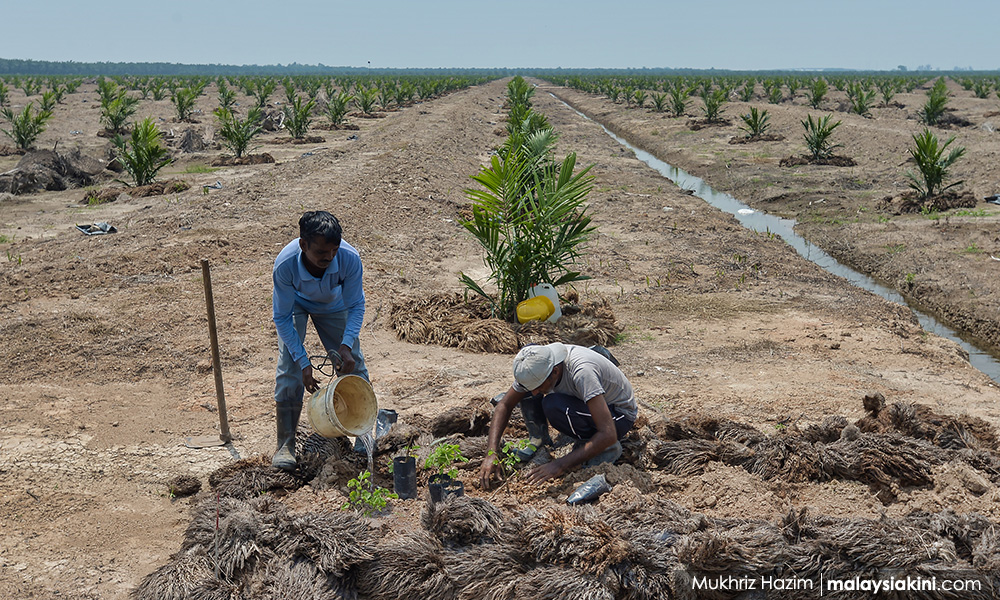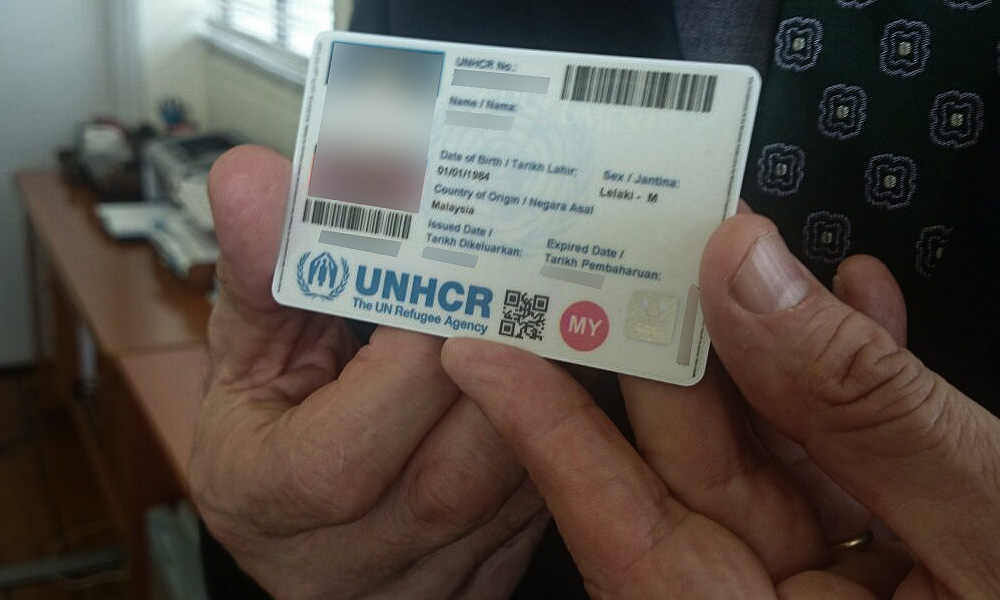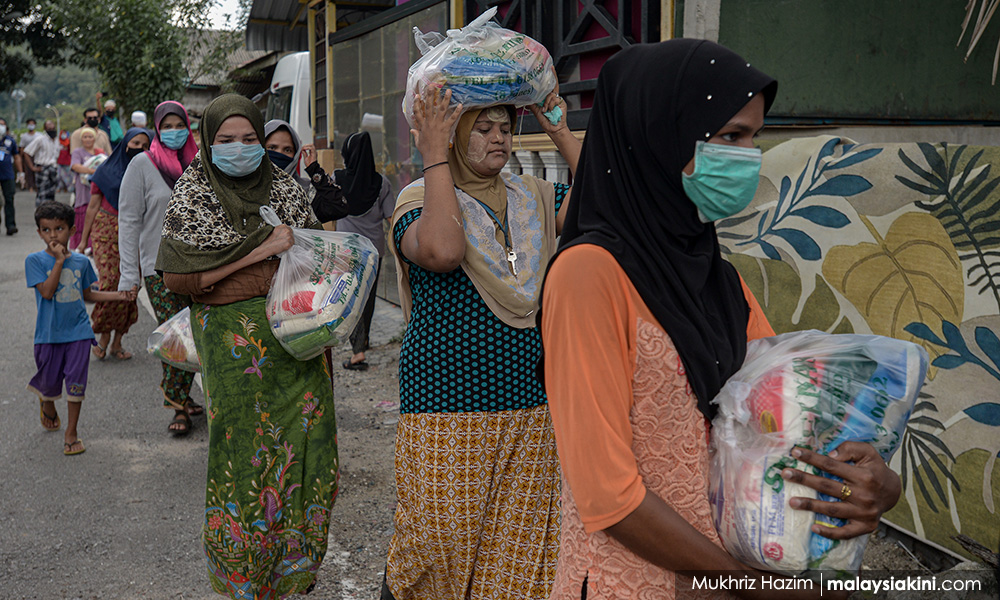Human rights organisation Tenaganita and the Malaysian Employers Federation (MEF) are calling on the government to grant refugees the legal right to work in the country.
Tenaganita programme director Glorene Das told Malaysiakini this will benefit both the industries facing a labour shortage and the refugee community by giving the latter the proper documentation to earn a living.
“Many of them (Rohingya refugees) have lived here forever and they are actually skilled workers. The ones from other countries are also professionals and skilled as well.
"So why can't we use the resource that they come with to benefit our country and also their own community?" Glorene said.
“They can be accordingly remunerated, so they can support their families and also the country's development,” she added.
Although refugees and asylum seekers have existed in Malaysia for decades, they are not recognised by the government.
Thus, many of them had to work in informal sectors and face potential arrest from authorities who consider them undocumented migrants.
MEF executive director Shamsuddin Bardan was also enthusiastic about the idea, pointing to the many vacancies waiting to be filled in several industries which can benefit from employing refugees.
“When you talk about the possible benefits to the employers (to employ refugees), these people are already in Malaysia, they are not considered as foreign workers.
“(Employers) do not have to worry about the transportation cost to get workers from other countries to Malaysia and there are no accommodation costs either.
“So I think these reasons possibly can attract companies or employers to employ refugees,“ he said.
Shamsuddin listed out industries such as plantations, construction, manufacturing and retail services, which are facing worker shortages due to a ban on new foreign workers permit and many returning to their home country during the Covid-19 pandemic.

He pointed out that the plantation industry, in particular, has 40,000 vacancies and a continued labour shortage will have damaging effects on the industry, with an estimated RM10 billion will be lost every year as a result.
The idea also resonated with former Malaysian Trades Union Congress (MTUC) secretary-general N Gopal Kishnam.
“Refugees or otherwise, they are human beings and I believe whatever assistance that refugees in Malaysia receive from UN organisations is insufficient.
“We shouldn’t waste their capabilities to work, and they should be given the opportunity to work legally,” Gopal, the co-chairperson of the Labour Law Reform Coalition (LLRC) said.
The issue of refugees' legal employment rights did not arise during his tenure as MTUC’s secretary-general from 2014-2016, but nonetheless, Gopal supports such initiatives.
Past pilot programme failed
Under the Pakatan Harapan administration in 2019, a pilot programme to employ Rohingya refugees in the plantation sector was put forward. However, it failed after a low turnout from the community.
Commenting on this, Shamsuddin claimed the refugees did not prefer to work in plantation estates. Instead, they preferred to work in urban areas and be self-employed.
Glorene, who is actively working with the refugee community, shared what she heard from those who had worked under the pilot programme.
“When you bring in the refugee community (to work in a plantation), they went there on their own, just like a migrant worker. All their life they've been with their family, but they've been told to go on their own.
“Some of them tried, and once they went there they had to cram up and live with other workers - they have no experience in doing that," she said.
She added that working conditions for them can be intolerable as well.
“(They had to go through) long hours of work, very low wages, no daily connection or communication with their families and that is what actually prompted them to leave,” Glorene revealed.
She said through her own experience working with the Rohingya refugees in Kuala Lumpur, she personally encountered them collecting vegetables and fruits thrown away by stalls in wholesale markets and selling them in the community.
“They take out the vegetables from the container and in the night, they will lay out the good vegetables to sell, they get more money from this than what they get working in the plantation.
“So again, if we put them in an exploitative system, a slavery-like situation for them to work, definitely they will run away and not accept it,” she explained.
Govt concerns over abuse of UNHCR cards
Abuse and fraud involving UN High Commissioner for Refugees (UNHCR) cards have also been an issue of contention when it comes to using that documentation as a basis for them to work legally.
There are 178,715 UNHCR cardholders in the country, according to the latest figure provided by Home Minister Hamzah Zainudin.

Shamsuddin is of the view that the issue of the genuineness of UNHCR cards has to be resolved first before refugees can fill in job vacancies.
“They (the government) are not sure whether the cards given to the refugees are genuine because there are a lot of reports saying that they are not.
“That is a major concern raised by the government which I think is a valid one," he said.
However, Glorene said this is nothing new and it is up to the ministries to come out with a monitoring and recruitment system, just like the one managing migrant workers.
“Why should it be any different? Some of the systems have to be worked out by the relevant ministries, to actually make sure that the document they hold, especially the UNHCR card, is not fake," she said.
Glorene believes now is a suitable time for ministries and organisations to come together to create a clear system to register and employ refugees, but stressed that middle persons, such as agents, must not be involved in order to prevent exploitation.
“This is how the fake documents, or forgeries and all that, come in. It has to be ministry to ministry, and together with the MEF, the community, and in this context, the UNHCR, to have a clear procedure or system for recruiting refugee workers,” she added.
Refugee work rights not new issue
Glorene said the push for the legal working rights of refugees had long been advocated by the UNHCR, but its proposals never developed into a comprehensive policy.
“Over the years, UNHCR had lengthy discussions with the Human Resources Ministry.
“In fact, they (the Human Resource Ministry) were very keen to push forward this idea of recruitment. But I think this always gets pushback from some in the Home Ministry because they see refugees, asylum seekers and migrant workers as a national security threat.
“I also want to repeat what I have been saying for years, that you don't have to sign on to any convention,” she said, referring to the 1951 Refugee Convention that Malaysia has yet to ratify.
Glorene said the Federal Constitution already provides obligations towards anybody who lives in the country.
“Regardless of status, I’d like to interpret it this way. And we are a member of the UN body, which means we still have obligations towards these people, making sure their rights are not violated in any way,” she added.
Malaysia is a country with plentiful resources, Glorene argued, and the people should share them with the most underprivileged, especially during difficult times like the Covid-19 pandemic.
“We're not giving them money and food, we are giving them the opportunity to work, not only to better themselves but in the long run to develop this country that we love very much."

Refugee communities in Malaysia received renewed attention after Hamzah took a strong stance on arresting undocumented migrants and refugees amid calls for amnesty while the country is undergoing the Covid-19 immunisation campaign.
The minister refused to tone down his rhetoric on migrants and refugees even after initially agreeing to work with the minister in charge of vaccination, Khairy Jamaluddin, on the issue.
Hamzah later said his ministry will cooperate with Khairy to ensure foreigners received their vaccination.
Last week, the National Task Force, which included agencies under Hamzah’s ministry, uploaded a poster on Rohingya migrants that triggered widespread condemnation from human rights organisations and MPs on both sides of the aisle, including Umno MP Nazri Abdul Aziz.
Nazri slammed the poster which antagonised Rohingya migrants, saying it was “un-Malaysian”, and voiced his support for refugees to work legally in the country.
DAP's Klang MP Charles Santiago and human rights advocate M Ramachelvam also called for a halt to anti-migrant and anti-refugee sentiments perpetuated by the authorities, especially towards the Rohingya people who are here due to government persecution in Myanmar.
However, the negative narrative on the Rohingya refugees persisted after Hamzah shared a list of migrant hotspots last Wednesday, which was based on Facebook complaints and after a leading daily paper published an article that courted flak for presenting an anti-Rohingya viewpoint. - Mkini




No comments:
Post a Comment
Note: Only a member of this blog may post a comment.